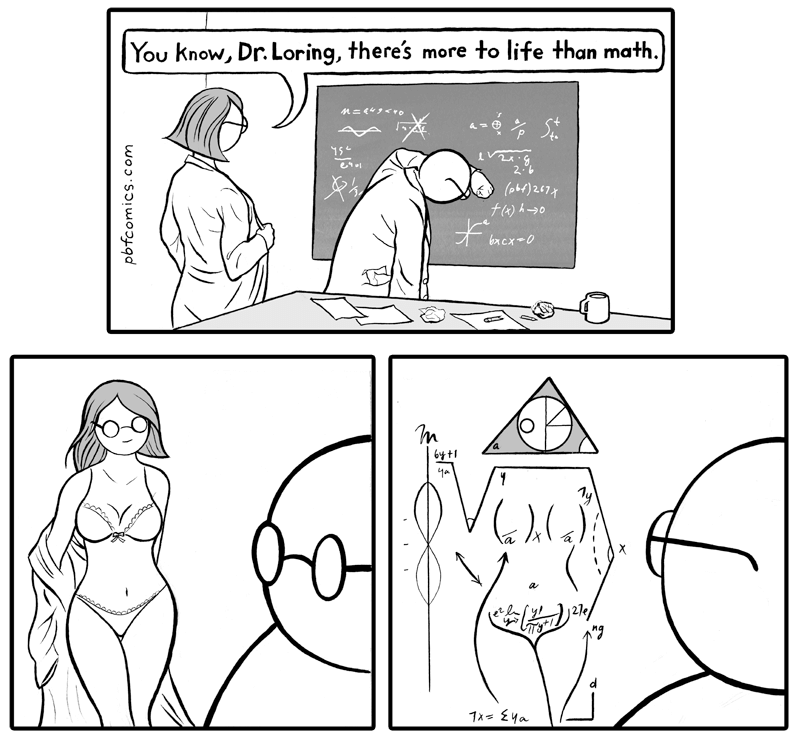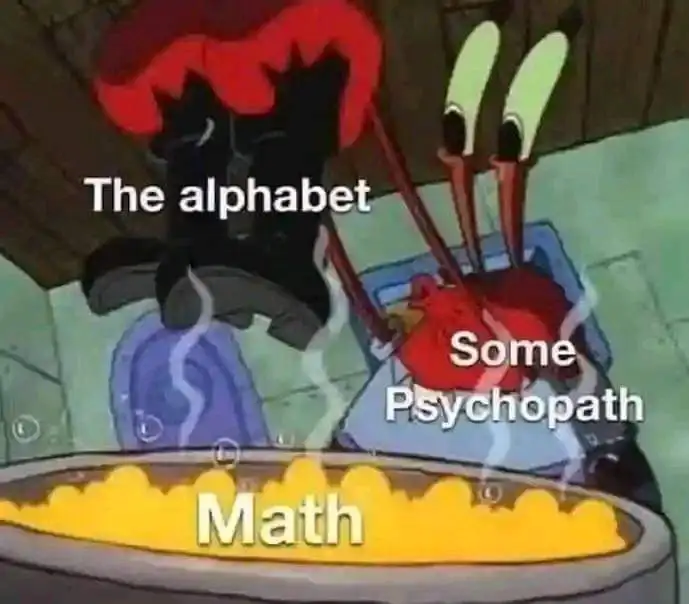Well here’s someone putting unnecessary math into their sex scene:

deleted by creator
What
…is the speed of a cumshot that reaches its target’s mouth 1 ft away in 0.28 seconds? Assume 6 mls of splooge. What is the transfer rate? If 80% of it hits the target and is immediately swallowed, what is the rate of loss?
It seems we’ve had a very different math lessons.
I went to catholic school
Yeah, feels like I’m missing something here.
What is the context for this? I am extremely entertained by the idea that this might be a thing.
It’s just an edit of this meme

several alphabets, in fact
once you run out of Latin letters you start using Greek, Hebrew, Fraktur, etc
I like using Japanese kana in my homework. I’m learning the language, and it helps with calming down after the rage of “what the hell is this thing, that doesn’t make any sense???”
As a result, i have to prove that the set ま is open.
I like that! I should start using Kana or cursive Cyrillic in my derivations to mess with the professors
Or fancy letters, like the L in a Laplace transformation.
And if that’s not enough, you just straight up make up new symbols, like Nabla
Ah yes, because other science fields like linguistics would never just grab random letters and turn them upside down to repurpose them!
əəəə… What do you mean? /j
There exist a mirroded E
Also a good way to start an essay
Sex is like math: you add the bed, subtract the clothes, divide the legs and pray you don’t multiply.
If you are in possession of a penis, pull your pants down slightly and put said penis in someone’s mouth, you achieve clothed oral sex outside of bed without dividing any legs and any chance of multiplying.
So nope.
Nice dick, bro, but I should emphasise that this can’t be just anyone’s mouth and you should check that the other person is enthusiastic about it all before beginning.
thanks and sure
i just tried to keep the situation as simple as possible for the thought experiment
What sentences make sense both in math and in a sex scene?
- These are some nice curves you’ve got, and that’s no hyperbole.
You guys are getting sex with your math?
If my math classes had had some sex scenes, maybe I wouldn’t have been so useless at it.
I would be more useless :).
Solve for x to see the money shot.
At the risk of outing the extreme perversity of my sick mind, I present the following math problems for your edification and enjoyment…
TW: Age-play
All participants are adult, even when otherwise is implied. Cat magic.
Yes, they are real math problems. I wrote up a bunch for a failed scene decades ago.
Enjoy.
Travel: On a road trip daddy is letting Tiffany steer the car. While Tiffany bounces softly on daddy’s lap, daddy is casually accelerating six miles per hour per minute. How far to they travel from the point they’re going 30 mph to when they’re going 90 mph?
Snack Time: Leslie is eating an enormous double-scooped ice-cream cone while Brenda is sucking on a huge Popsicle. Leslie’s long licks up the side and along the top of her two scoops each average 8 seconds and 5 such licks consume an ounce of ice cream. Meanwhile, Brenda’s sucking strokes are only 4 seconds long. But the juice-bar is so big she can only contain 2 inches of frozen fruity goodness in her mouth at a time. It takes 20 such strokes for Brenda to wear away an inch of her tasty treat. If Leslie’s ice cream cone is 16 ounces and Brenda’s Popsicle is 9 inches long, and it takes Leslie just as long to eat the cone as it does Brenda the last two inches of Popsicle, then which girl will finish their snack first, and by how much time?
Sleep Time: On Friday night, Teresa has a slumber party with six other girls. Daddy takes 30 minutes to tuck Teresa in, plus 5 minutes each to tuck in the other girls at the party, except Veronica with whom he takes 45 minutes. Daddy also takes 20 minutes to tuck in Teresa’s little sister, Holly, and an hour to tuck in Teresa’s older sister, Barbie. At what time does Daddy have to start getting girls ready for bed in order to have them all in bed by 10:00 pm?
I was not ready for the truly unholy unit of mile per hour per minute
I mean that’s just how acceleration works. Speed is distance over time, acceleration is change in speed over time, hence distance over time (speed) over time
That’s not the problem. Coming from metric, I expected m s-2 for acceleration. The imperial units for distances are weird enough in their own right – but using two different units of time for the two time derivatives is truly unholy.
I use mph because that’s what the speedometer reads. But mile/min² is easy to compute by dividing mile/hr/min by 60. Once the starting and ending speed are converted (assuming impulse is a constant) the law of accelleration neatly applies.
See I glossed over that because that’s an entirely nonsensical issue. Do you measure the speed of your vehicle based off how much distance you cover per second or per hour? And then there’s the fact that it’s a math problem, written at roughly a middle school level - half the problem is figuring out how long it takes them to get up to the desired speed and if they did that in a person hour scale it would leave almost no math for the student to do
Especially in a middle school math/physics setting, I would expect reasonable units. Otherwise, how would kids understand the relationship between force and acceleration? Do you use mile / hour / min for the acceleration due to gravity as well? Do you have a funky replacement for Newton too?
What is daddy doing with Barbie and Veronica?
Actuarial consultation, obviously.
This is what my family thinks public school is like
algebra rule 34
💀















